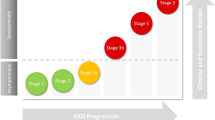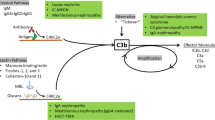Abstract
Background
To investigate the impact of proteinuria on the renal function of patients with metastatic renal cell carcinoma (mRCC) who received axitinib, a tyrosine kinase inhibitor specifically targeting vascular endothelial growth factor receptors.
Methods
This study included 65 consecutive Japanese patients who were diagnosed with mRCC and were subsequently treated with axitinib for at least 12 weeks. The association between the changes in the estimated glomerular filtration rate (eGFR) and proteinuria in these 65 patients was retrospectively assessed.
Results
Of the 65 patients, 41 (63.1 %) were judged to be positive for proteinuria. There were no significant differences between the eGFR value before the introduction of axitinib and that at the last clinic visit in either group with or without proteinuria. Furthermore, no significant correlation was noted between the changes in eGFR and the urine protein to creatinine ratio in the group positive for proteinuria, and there was no significant effect of the duration of treatment with axitinib on the changes in eGFR in the proteinuria group. Of several factors examined, univariate analysis identified age, eGFR prior to the introduction of axitinib, and timing of axitinib introduction, but not the presence of proteinuria, as predictors of a decrease in eGFR of >10 %; however, only age appeared to be independently associated with a decrease in eGFR of >10 %.
Conclusions
These findings suggest that treatment with axitinib may not have a significant adverse impact on the renal function in patients with mRCC, irrespective of the presence of proteinuria.


Similar content being viewed by others
References
Figlin R, Sternberg C, Wood CG (2012) Novel agents and approaches for advanced renal cell carcinoma. J Urol 188:707–715
Kelly RJ, Rixe O (2009) Axitinib—a selective inhibitor of the vascular endothelial growth factor (VEGF) receptor. Target Oncol 4:297–305
Hu-Lowe DD, Zou HY, Grazzini ML et al (2008) Nonclinical antiangiogenesis and antitumor activities of axitinib (AG-013736), an oral, potent, and selective inhibitor of vascular endothelial growth factor receptor tyrosine kinases 1, 2, 3. Clin Cancer Res 14:7272–7283
Rini BI, Escudier B, Tomczak P et al (2011) Comparative effectiveness of axitinib versus sorafenib in advanced renal cell carcinoma (AXIS): a randomised phase 3 trial. Lancet 378:1931–1939
Izzedine H, Massard C, Spano JP et al (2010) VEGF signalling inhibition-induced proteinuria: mechanisms, significance and management. Eur J Cancer 46:439–448
Yang JC, Haworth L, Sherry RM et al (2003) A randomized trial of bevacizumab, an anti-vascular endothelial growth factor antibody, for metastatic renal cancer. N Engl J Med 349:427–434
Ueda T, Uemura H, Tomita Y et al (2013) Efficacy and safety of axitinib versus sorafenib in metastatic renal cell carcinoma: subgroup analysis of Japanese patients from the global randomized Phase 3 AXIS trial. Jpn J Clin Oncol 43:616–628
Birn H, Christensen EI (2006) Renal albumin absorption in physiology and pathology. Kidney Int 69:440–449
Motzer RJ, Bacik J, Schwartz LH et al (2004) Prognostic factors for survival in previously treated patients with metastatic renal cell carcinoma. J Clin Oncol 22:454–463
Levey AS, Stevens LA, Schmid CH et al (2009) A new equation to estimate glomerular filtration rate. Ann Intern Med 150:604–612
Cohen RB, Oudard S (2012) Antiangiogenic therapy for advanced renal cell carcinoma: management of treatment-related toxicities. Invest New Drugs 30:2066–2079
Rixe O, Bukowski RM, Michaelson MD et al (2007) Axitinib treatment in patients with cytokine-refractory metastatic renal-cell cancer: a phase II study. Lancet Oncol 8:975–984
Tomita Y, Uemura H, Fujimoto H et al (2011) Key predictive factors of axitinib (AG-013736)-induced proteinuria and efficacy: a phase II study in Japanese patients with cytokine-refractory metastatic renal cell carcinoma. Eur J Cancer 47:2592–2602
Peterson JC, Adler S, Burkart JM et al (1995) Blood pressure control, proteinuria, and the progression of renal disease. The modification of diet in renal disease study. Ann Intern Med 123:754–762
Patel TV, Morgan JA, Demetri GD et al (2008) A preeclampsia-like syndrome characterized by reversible hypertension and proteinuria induced by the multitargeted kinase inhibitors sunitinib and sorafenib. J Natl Cancer Inst 100:282–284
Conflict of interest
Hideaki Miyake, Ken-ichi Harada, and Masato Fujisawa received lecture fees from Pfizer; Satoshi Imai and Akira Miyazaki have no conflict of interest.
Author information
Authors and Affiliations
Corresponding author
About this article
Cite this article
Miyake, H., Harada, Ki., Imai, S. et al. Non-significant impact of proteinuria on renal function in Japanese patients with metastatic renal cell carcinoma treated with axitinib. Int J Clin Oncol 20, 796–801 (2015). https://doi.org/10.1007/s10147-014-0770-7
Received:
Accepted:
Published:
Issue Date:
DOI: https://doi.org/10.1007/s10147-014-0770-7




